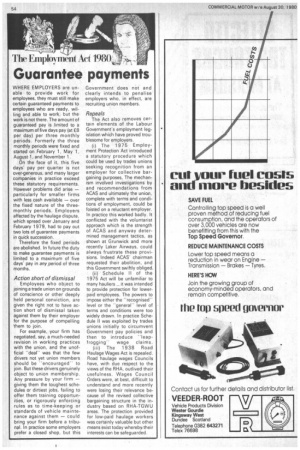The Employment Ad 1980
Page 56

If you've noticed an error in this article please click here to report it so we can fix it.
Guarantee payments
WHERE EMPLOYERS are unable to provide work for employees, they must still make certain guaranteed payments to employees who are ready, willing and able to work, but the work is not there, The amount of guaranteed pay is limited to a maximum of five days pay (at £8 per day) per three monthly periods. Formerly the three monthly periods were fixed and started on February 1, May 1, August 1, and November 1.
On the face of it, this five days' pay per quarter is not over-generous, and many larger companies in practice exceed these statutory requirements. However problems did arise — particularly for smaller firms with less cash available — over the fixed nature of the threemonthly periods. Employers affected by the haulage dispute, which spread over January and February 1979, had to pay out two lots of guarantee payments in quick succession.
Therefore the fixed periods are abolished. In future the duty to make guarantee payments is limited to a maximum of five days' pay in any period of three months.
Action short of dismissal
Employees who object to joining a trade union on grounds of conscience or other deeply held personal conviction, are given the right not to have action short of dismissal taken against them by their employer for the purpose of compelling them to join.
For example, your firm has negotiated, say, a much-needed revision in working practices with the union, and the unofficial "deal" was that the few drivers not yet union members should be "encouragedto join. But these drivers genuinely object to union membership. Any pressure by your firm — giving them the toughest schedules or dirtiest jobs, failing to offer them training opportunities, or rigorously enforcing rules as to time-keeping or standards of vehicle maintenance against them — could bring your firm before a tribunal. In practice some employers prefer a closed shop, but this
Government does not and clearly intends to penalise employers who, in effect, are recruiting union members.
Repeals
The Act also removes certain elements of the Labour Government's employment legislation which have proved troublesome for employers.
(i) The 1975 Employment Protection Act introduced a statutory procedure which could be used by trades unions seeking recognition from an employer for collective bargaining purposes. The mechanism involved investigations by and recommendations from ACAS and ultimately the union, complete with terms and conditions of employment, could be foisted on a reluctant employer. In practice this worked badly. It conflicted with the voluntarist approach which is the strength of ACAS and anyway determined management tactics, as shown at Grunwick and more recently Laker Airways, could always frustrate these provisions. Indeed ACAS' chairman requested their abolition, and this Government swiftly obliged.
(ii) Schedule II of the 1975 Act will be unfamiliar to many hauliers _ it was intended to provide protection for lower paid employees. The powers to impose either the -recognised" level or the "general" level of terms and conditions were too widely drawn. In practice Schedule II was exploited by trades unions initially to circumvent Government pay policies and then to introduce "leapfrogging" wage claims.
(iii) The 1938 Road Haulage Wages Act is repealed. Road haulage wages Councils have, with due respect to the views of the RHA, outlived their usefulness. Wages Council Orders were, at best, difficult to understand and more recently were losing their relevance because of the revised collective bargaining structure in the industry based on RHA-TGWU areas, The protection provided for low-paid haulage workers was certainly valuable but other means exist today whereby their interests can be safeguarded.




























































































